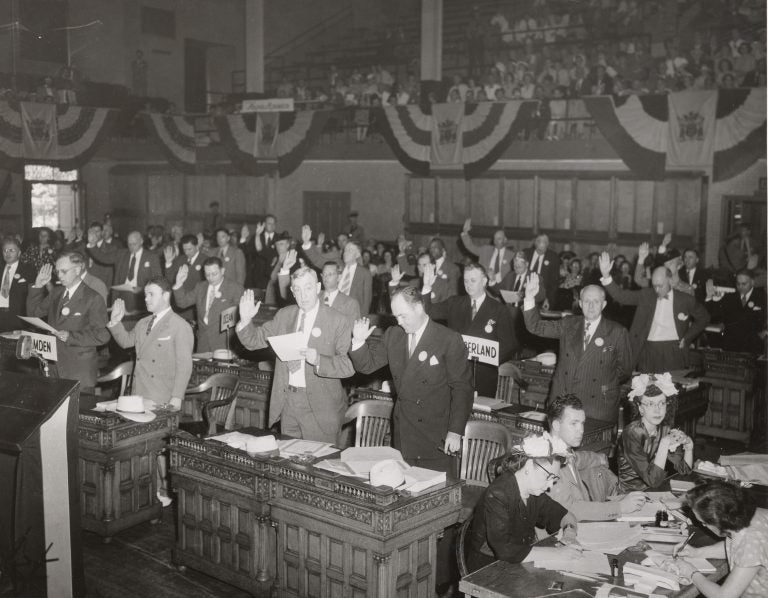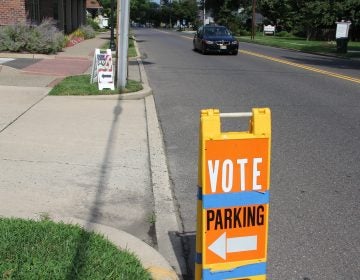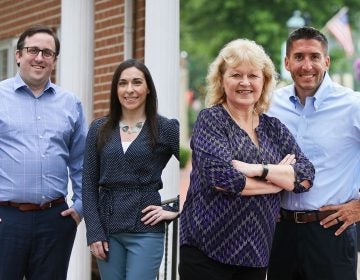N.J. has elections in odd years — you can thank the Constitution of 1947 for that
The conveners of the 1947 state constitutional convention chose to hold state elections during the years when there are no federal elections.
Listen 4:12
Delegates to the 1947 New Jersey Constitutional Convention, most likely during the swearing-in ceremony. (New Jersey State Archives, Department of State)
It may come as a surprise to some Garden Staters that there is an election this year.
In the General Assembly, all 80 seats are up for grabs, and there is one special state Senate election in South Jersey on Nov. 5.
New Jersey is one of just five states that hold elections for statewide office in odd-numbered years.
To understand why you have to go back to 1947.
In that year, John Kolesar was just starting out as an undergraduate at Rutgers University in New Brunswick. One day, he went to pick up some books at the gym and noticed something across the room.
“There was this crowd of people with a PA system going, but I couldn’t make out what they were saying,” Kolesar said. “And I asked one of the upperclassmen, I said, ‘What the hell is that over there?’ And he said, ‘Ah, that’s the constitutional convention.’”
New Jersey politicians had gathered at the university to come up with a new governing document to replace the 1844 constitution, which was outdated and had left the state government prone to corruption.
The constitution devised by the delegates in 1947 gave the executive branch more power and streamlined the state’s disorganized court system.
Kolesar, who later became a New Jersey statehouse reporter and sometime state official, said it catapulted New Jersey from a joke to a national model.
“It became the most modern legislature and government in the country from being the most ancient, out-of-whack one,” Kolesar said.
The new constitution also determined that elections for governor and the state legislature would take place in odd-numbered years, unlike federal elections, which take place in even-numbered ones.
The staggered elections — state offices one year, federal offices the next — would mean that voters could weigh in on state issues without being influenced by the popular national policy debates of the time.
“The importance of a gubernatorial election merits an election that will not be overshadowed by a national contest for the Presidency. The problems confronting the State are frequently distinct from those confronting the nation,” then-Governor Alfred E. Driscoll, a Republican from Haddonfield, argued to the delegates.
“If we are to develop a new working federalism in this country and thus save the republican form of government, guaranteed incidentally in the Federal Constitution, federal election should determine national policies, while the state election should determine state policies and administrative issues of major importance,” he added.
But there was another reason Driscoll may have wanted to stagger state and federal elections: Franklin D. Roosevelt.
A few years earlier, in 1944, Roosevelt had just won his fourth term as president. (The 22nd Amendment, which would set a two-term limit for the presidency, would be ratified in 1951.)
The Democrat was popular across the country, including in New Jersey, and some political watchers surmised that Driscoll and his fellow Republicans no longer wanted to lose their statewide elections because a popular national Democrat was on the ticket.
“There was thinking on the part of Republican legislators who dominated the legislature before 1947 that they were tired of losing to Roosevelt, and so they wanted to change it,” said Lew Thurston, the chief of staff to former Republican Gov. Tom Kean.
“The irony was that Eisenhower won right after that by huge margins, which would have benefitted Republicans,” Thurson added.
Nevertheless, New Jersey continued to hold state elections in off years, joining a small club of states including Virginia and Kentucky.
Critics of off-year elections have pointed out that that enthusiasm is lower during state election years because voters typically turn out for buzzed-about national races.
That has been true in New Jersey. In the 2016 presidential election, 68% of registered New Jersey voters came to the polls. But a year later, in the 2017 gubernatorial race, just 39% of voters cast a ballot.
Yet others have argued that there are advantages to holding one primary and one general election each year.
Bob Giles, director of the New Jersey Division of Elections, said the frequency of elections means the state’s 26,000 poll workers stay familiar with the election day process and how voting machines work.
“The same with the voters. They understand that every June there’s a primary, every November there’s an election,” Giles said. “It’s just a matter of who’s on the ballot.”
WHYY is your source for fact-based, in-depth journalism and information. As a nonprofit organization, we rely on financial support from readers like you. Please give today.





